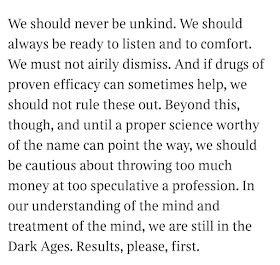Here is how the substantive line of reasoning gets going. Treatment should be based on science, Parris is going to say, and psychiatry isn't scientific:
This is a ludicrously limited understanding of science. There is virtually no area of medicine where patients behave like the billiard balls of Parris' schoolboy physics. Medical science is generally probabilistic; surgeries tend to have a particular outcome, babies tend to emerge in particular ways. Psychiatry is more probabilistic than most, dealing as it does with cognitions and affects rather than hearts and livers, but the empirical principles are the same. To try and reign in the uncertainty, patients are grouped together by diagnoses and provided with treatments. What works best is what gets recommended for the NHS. That formula doesn't always get implemented properly, and we can argue about ways to change it, but it's misleading to ignore the fact that it exists as an ideal.
To bolster his case about the unscientific foundations of therapy, Parris makes reference to psychoanalysis:
When he does turn to the dominant mode of NHS therapy, Parris' ignorance is astounding. First he paints a picture on which the only sort of research conducted into therapy's effectiveness is from the most casual inquiry on the part of the therapist:
Then, with the sort of comic assuredness that can only come from profound ignorance of the literature, he cooks up a scheme for how such research might be better conducted:
These passages suggest that Parris cannot have read -- nor read about -- a single randomly controlled trial of psychotherapy in preparation for his essay on psychotherapy. Only someone in such a state of epistemic innocence could suggest with a straight face that, hey, psychiatrists might like to conduct a systematic test of their treatments one of these days. The problem he thinks he as identified was foundational for the project of psychotherapy research, well over 50 years ago. The broad consensus of that literature is that psychotherapy is helpful. Parris could take issue with those results but instead he doesn't acknowledge they exist.
There follow some rather waffly personal reflections on the ascendancy of therapy as a culturally available means of dealing with distress, and the vagaries of psychopharmacology. With regard to the first Parris says that he was averse to seeking therapy on the two occasions it was offered to him. This tells us little about the value of therapy per se and only about Parris' attitude toward it. Fair enough - psychotherapy should always be an informed choice.
On the latter issue he makes some concerned noises, but may as well have pasted in the shrug emoji:
There follow some half baked worries about Ritalin use in schools and the rising demand for antidepressants, but without any solid idea of what impact these things are having Parris just sounds like Robert Whitaker without the conviction or the reference list.
All of this is building up to what amounts to a tepid call for hesitation about funding:
This is infuriatingly facile. It's just the old Cameron idea of the Big Society, warmed over. Moreover, however shaky the ground he has trodden to get to this conclusion, the things he has left out are even more damning. Everyone can surely agree that kindness is essential in mental health. What is so frequently missing, and what drives people to campaign for increased funding in the sector, is the means to implement that kindness.
Parris tries (unconvincingly) to debunk therapy and medication, but he doesn't even touch on the most important parts of mental health. Put aside therapy, put aside medications, a huge amount of mental health care consists of things that are far more basic and important and done by people who aren't particularly interested in Freud, CBT or Ritalin. It can be found in practical support with daily tasks, in messy intervention at times of crisis, in advocacy, in needs and risk assessments, and in simple human contact.
The contemporary mental health crisis emerges not in the consulting room, but in A&E departments, job centres and community mental health teams. It arises because people in intense distress are showing up in all sorts of places that have neither time nor resources to help them. The political push for more mental health funding is not some rarefied thing that can be separated from the kindly pastoral figures that inhabit the conservative imagination. There can be no kindness where there are no people available to offer it.
Parris tries (unconvincingly) to debunk therapy and medication, but he doesn't even touch on the most important parts of mental health. Put aside therapy, put aside medications, a huge amount of mental health care consists of things that are far more basic and important and done by people who aren't particularly interested in Freud, CBT or Ritalin. It can be found in practical support with daily tasks, in messy intervention at times of crisis, in advocacy, in needs and risk assessments, and in simple human contact.
The contemporary mental health crisis emerges not in the consulting room, but in A&E departments, job centres and community mental health teams. It arises because people in intense distress are showing up in all sorts of places that have neither time nor resources to help them. The political push for more mental health funding is not some rarefied thing that can be separated from the kindly pastoral figures that inhabit the conservative imagination. There can be no kindness where there are no people available to offer it.





